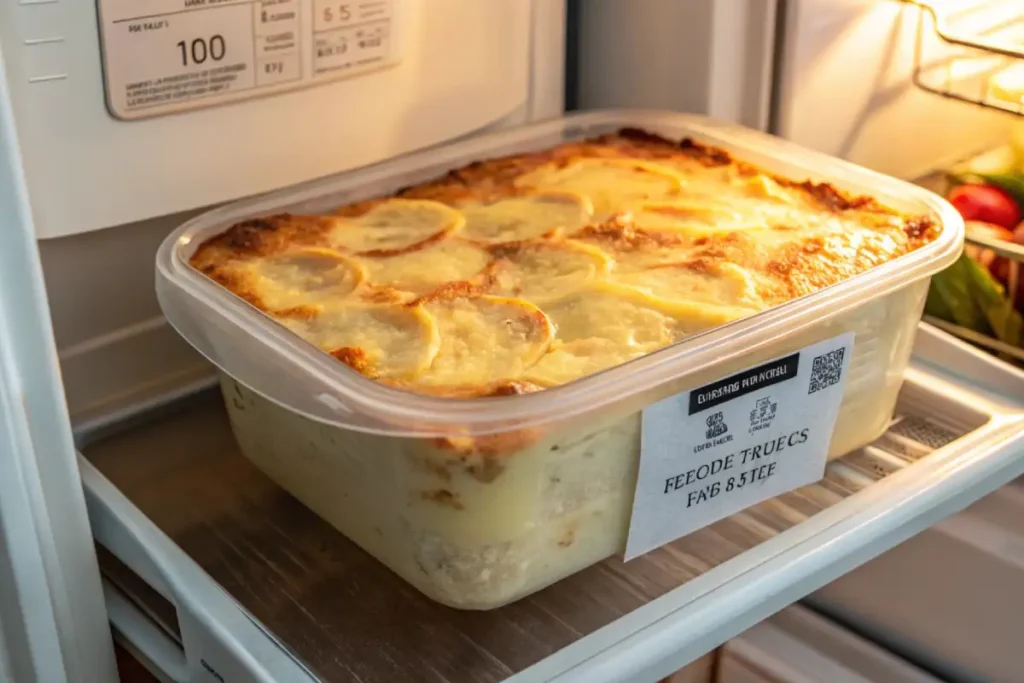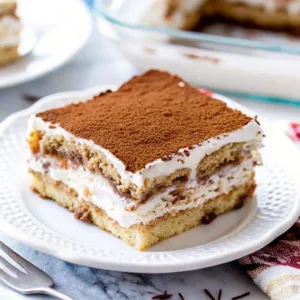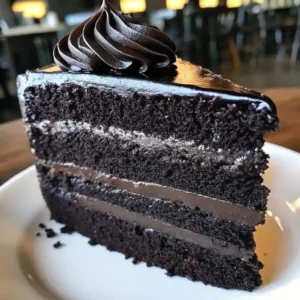Can you freeze scalloped potatoes? This is a common question for anyone who loves this cozy classic dish made with tender, thinly sliced potatoes baked in a creamy, flavorful sauce. Perfect for holidays, special occasions, or even a comforting weeknight meal, scalloped potatoes are a versatile favorite. But if you’ve made too much or want to prepare them ahead of time, freezing can be a great option—if done correctly. Let’s explore whether freezing affects their texture or flavor and how to do it properly.
Table Of Contents
Table of Contents
Yes! If you follow the right techniques it is possible to preserve scalloped potatoes in the freezer and then enjoy them later on and still taste as delicious and delicious as they did when freshly prepared. This guide will provide the best methods of freezing, thawing, or heating scalloped potatoes while preserving their original flavor.
Why Freeze Scalloped Potatoes?
The process of freezing scalloped potatoes isn’t only practical, it’s also a time saver. When you’re meal-prepping for an upcoming week, saving the leftovers for a party, or planning an upcoming holiday party The ability to freeze this dish will help you make the most of its ease of use. Here’s the reason why freezing scalloped potatoes is a fantastic idea
- Reduce food waste The leftovers can be stored for later use instead of being put into the garbage.
- Save time Making potatoes that are scalloped in advance is an absence of worries during busy times.
- Convenience: Frozen scalloped potatoes are a convenient option for meals with family or unexpected guests.
Can You Freeze Scalloped Potatoes Without Compromising Quality?
Yes, however, the process needs attentiveness. Since scalloped potatoes are covered with a creamy sauce they are susceptible to texture changes if they are not properly frozen. For optimal outcomes, adhere to these guidelines:
- Use sturdy Potatoes: Starchy varieties such as Yukon Gold or Russets hold their shape better when frozen and heated.
- Beware of overcooking slightly undercooked potatoes to stop them from becoming mushy afterward.
- Get the perfect Sauce Choose the roux-based sauce rather than heavy cream because it’s less likely to break when frozen.
Step-by-Step Guide to Freezing Scalloped Potatoes
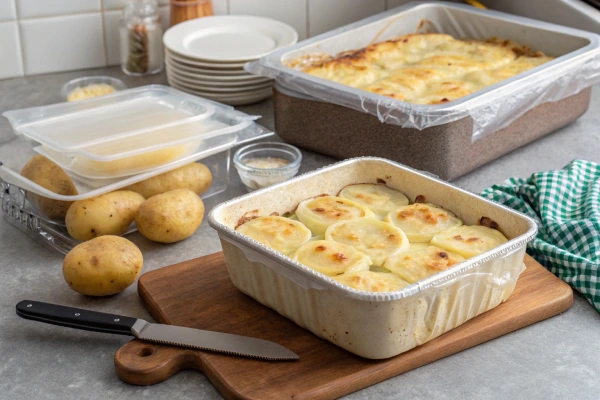
1. Prepare the Dish
Cook the scalloped potatoes in the same way as normal but undercook them. This allows them to retain their shape and prevents the potatoes from becoming too soft after being reheated.
2. Cool the Dish Completely
Let the potatoes that have been scalloped cool to room temperature before freezing. While they are still warm, freezing them may cause steam and lead to ice crystals which can alter the texture and taste.
3. Portion the Dish
Split the scalloped potatoes into single-serving or meal-sized portions. Smaller portions can be frozen faster which makes reheating easier.
4. Choose the Right Container
Utilize airtight containers, freezer bags, or disposable foil pans. They will prevent air exposure which can lead to burning in the freezer, and can alter the flavor of the dish.
5. Wrap Securely
Cover the container in plastic wrap, then an aluminum foil cover. This double layer of protection reduces the possibility of freezing burns.
6. Label Clearly
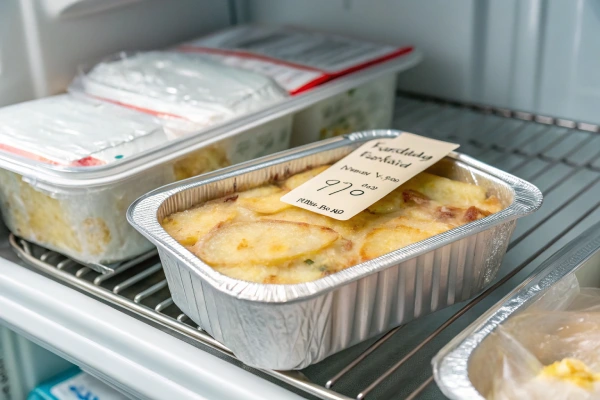
Note the date and the contents of the container. Labeling the container correctly will help you make use of the scalloped potatoes within the timeframe that is recommended.
7. Freeze Flat
Lay your dish on its side in the freezer. This ensures that the layers remain intact and stops the creamy sauce from accumulating within one place.
How Long Can Scalloped Potatoes Be Frozen?
The potato scallops may be kept frozen for as long as three months. After this time the quality could start to decline and the texture and taste become more apparent. To get the best results, you should consume frozen scalloped potatoes during the initial two months.
Best Practices for Maintaining Quality
Use High-Quality Ingredients
The quality of the scalloped potatoes you cook is dependent on the ingredients you choose to use. Make sure you use freshly cooked, starchy potatoes as well as homemade sauce to get the most optimal results.
Minimize Air Exposure
Freezer burn happens when food items are exposed to the air for prolonged periods. Be sure that your food is well sealed and think about using vacuum sealed bags to ensure maximum freshness.
Freeze Quickly
The speedy freezing process reduces the growth of large crystals of ice that could ruin the texture of the scalloped potatoes. The dish should be placed in the coldest area within the freezer to increase the speed of the process.
How to Thaw and Reheat Scalloped Potatoes
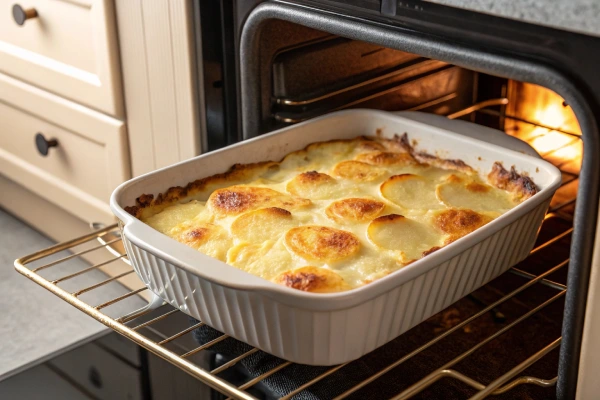
Thaw Gradually
The safest method of thawing scalloped potatoes is to transfer them to the refrigerator in the evening before you are planning to consume them. This process slows down the texture and stops the growth of bacteria.
Reheat in the Oven
- The oven should be preheated up to 350 degrees F (175 degrees C).
- Get rid of any foil or plastic wrap and then cover the dish with new aluminum foil.
- Bake for 25-30 minutes or until the food is heated. For a crisp topping, remove the foil in the final five minutes.
Microwave Option
If you’re in a hurry heating it in the microwave is also an option. Choose a microwave-safe dish place it over a plate and then heat it in two-minute intervals using medium power, while stirring frequently to ensure even heating.
Expert Tips for Perfect Scalloped Potatoes
Add Fresh Toppings
Serve with fresh toppings like breadcrumbs or shredded cheese for more taste and texture. If you’re interested in trying an alternative that gives it some sweetness and a unique flavor look into the sweet potato that is scalloped. This recipe turns the traditional dish into something unique suitable for special occasions, or to experiment with your kitchen.
Enhance the flavor of cooked scalloped potatoes by adding fresh toppings such as cheese shredded or breadcrumbs. You can also add chopped herbs. Broil for just a few minutes for a golden, crisp crust.
Brighten the Flavor
Sometimes, freezing can alter the flavor. Include some salt or freshly cracked pepper or sprinkle paprika to spice the dish once it has been reheated.
Serve With Complementary Dishes
Serve scalloped potatoes alongside roasted vegetables, grilled chicken, or a salad that is fresh to offset the richness of the dish.
FAQs About Can you freeze scalloped potatoes
Does Freezing Affect the Texture of Scalloped Potatoes?
The effect of freezing can be slight and alter the texture, particularly when the potatoes are completely done cooking or the recipe is prepared using cream. The steps above can minimize these impacts.
Can You Freeze Scalloped Potatoes With Cheese?
The scalloped potato that contains cheese can be frozen well. Cheeses made of hard like cheddar, or Parmesan retain their flavor and texture more than soft cheeses.
Is It Better to Freeze Unbaked Scalloped Potatoes?
The option of freezing unbaked scalloped potatoes without baking is an excellent alternative. Make the dish, then store it in the freezer, and bake it when you need to for a fresh taste.
How Do I Prevent Freezer Burn?
Make sure that the dish is securely sealed using foil and plastic wrap. Vacuum-sealed bags can also help to prevent the risk of air exposure.
How Long Does It Take to Reheat Frozen Scalloped Potatoes?
Reheating usually takes between 25 and 30 hours in an oven. The time can vary based on the size of the dish and if the dish was chilled before freezing.
Conclusion: Can You Freeze Scalloped Potatoes?
The process of freezing scalloped potatoes is a great way to save time, reduce food waste, and enjoy this delicious dish whenever you’d like. With the right methods, you can freeze, store, and reheat your scalloped potatoes without losing their creamy texture or rich flavor. Can you freeze scalloped potatoes? Absolutely! Whether you’re meal prepping, saving leftovers, or planning for an event, these techniques will ensure your scalloped potatoes taste as fresh as the day they were made. With this guide, you’ll master the art of freezing scalloped potatoes and always have a comforting dish ready to enjoy!
Looking for more tasty recipes and cooking inspiration? Connect with us on Facebook at Dashtasty and become part of our foodie family.
